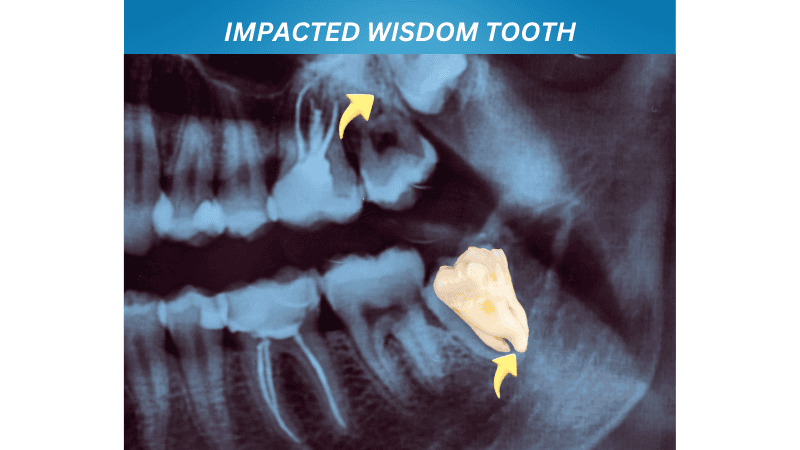
Wisdom teeth, also named as third molars, are the last teeth in the mouth. Generally, there are four wisdom teeth in the oral cavity behind the second molars. However, some individuals have fewer or none at all. Wisdom teeth erupt usually in their late teens or early twenties. Due to their position in the oral cavity, they cause problems and need removal. Discover helpful strategies for managing pain after wisdom tooth extraction. Explore tips for reducing swelling, alleviating discomfort, and speeding up recovery for a smoother healing process.
The most common reason to remove or extract wisdom tooth is impaction or lack of space in the jaw. When there is not enough space in jaw for wisdom teeth to erupt properly,they may emerge at an angle or remain partially or fully impacted causing

sometimes, Dentists may recommend wisdom teeth extraction as preventive measure without any symptoms to reduce the risk for future problems.
After removal of wisdom tooth, the intensity of symptoms depend upon the complexity of extraction and your body’s individual healing process. Post wisdom teeth removal, you can expect to have
The pain experienced after wisdom tooth removal varies from person to person but modern anesthesia and pain management techniques have made this procedure quite easy and almost painless. post operative pain can be easily managed by prescribed pain relievers. Following your surgeon’s post-operative instructions closely, including the use of ice packs and gentle oral hygiene practices, can help healthy wisdom tooth healing during the recovery process.
The duration of a wisdom teeth extraction surgery can vary depending on its complexity, the number of teeth being removed, and whether the procedure is done under local anesthesia, sedation, or general anesthesia.
The worst day of pain after wisdom tooth extraction often occurs 2 to 3 days post-surgery, when swelling and discomfort typically peak. On this day, you may experience intense soreness, throbbing, and swelling around the extraction sites, which can radiate to your jaw, neck, or even your ears. Although this day can be the most difficult, it’s usually temporary, and the pain tends to decrease significantly after the 3rd day. If the pain becomes unbearable or you suspects a complication like a dry socket or infection, you must contact your dentist or oral surgeon.
Healing wisdom tooth extraction can be challenging but managed efficiently by following some recovery tips.
The average recovery time from wisdom teeth removal depends upon the complexity of the extraction and individual healing factors, but generally, it takes about 1 to 2 weeks for the initial recovery. During this period, most swelling and discomfort should subside. Within the first few days, you may experience significant swelling, bruising, and soreness, typically peering around 48 to 72 hours after surgery. The soft tissue around the removal site usually heals one to two weeks after the extraction, but the bone may take 3 to 6 months to recover fully. Following your dentist’s or surgeon’s instructions is essential to aid proper healing and reduce the risk of complications.
Complications after wisdom teeth removal, though relatively rare, can occur and may include
Wisdom teeth are often removed to prevent or address various dental issues. These third molars, can become impacted (unable to erupt fully), causing pain, infection, and damage to surrounding teeth. They may also contribute to crowding or misalignment of other teeth. Wisdom teeth are more prone to develop cavities or gum disease due to their position at the back of the mouth. Most of the time, due to lack of space in the jaw, they erupt at odd angles, causing harm to nearby teeth or leading to cysts and other complications. Removing wisdom teeth proactively helps reduce the risk of these issues and ensures better long-term oral health.
Disclaimer: Health content shared on this website is for educational and informational purpose only not a substitute for professional medical advice,diagnosis and treatment.
All rights reserved @ healthblogger.online